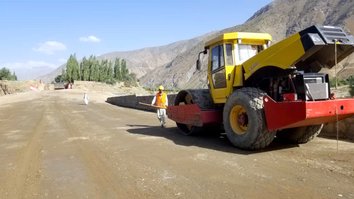KUNDUZ -- Work on asphalting roads in parts of Kunduz city and other development projects have kicked off as prospects for peace continue to grow.
The peace talks in Doha, Qatar, are spurring optimism for the future of Afghanistan, said Esmatullah Muradi, a spokesman for the Kunduz governor, adding that officials have begun work on various development projects.
"A contract for the asphalting of 3km of Bagh-e-Zeraat road in Kunduz city was signed on December 5," he said. The work will cost 115 million AFN ($1.5 million) and be completed in the coming six months.
This project, funded by Germany, also includes the construction of bridges, culverts, and side ditches, said Muradi. Once completed, the initiative will address the transportation needs of more than 1,000 families.
![Workers lay asphalt on a road in Kunduz city on December 4. [Hedayatullah]](/cnmi_st/images/2020/12/16/27431-dsc_0230-585_329.jpg)
Workers lay asphalt on a road in Kunduz city on December 4. [Hedayatullah]
Projects such as these have created hundreds of jobs for Kunduz residents over the past year.
The local government also will start constructing fortifications on the Naqi River in Khanabad District and Kunduz city by the end of December, according to Muradi. The structures will prevent the erosion of more than 10,000 hectares of farmland during wet seasons.
Meanwhile, the construction and asphalting of the second section of the Zer-e-Dawra road leading to the airport in the centre of the city started on December 14.
The section is 5.5km long, which workers will asphalt at a total cost of 148 million AFN ($1.9 million) and which the Asian Development Bank is funding, according to Mohammad Zahid, director of the Kunduz Department of Public Works.
The project includes constructing side ditches, installing flowerpots, laying mosaics on the sidewalks and installing solar street lights, he added.
Workers asphalted the first 6km section of the road with the support of Germany in 2017. The completion of the second phase of the road will offer transportation facilities to inhabitants of the province while addressing traffic congestion, he added.
"Fortunately, with the negotiating sides moving closer, the development process in Kunduz Province has accelerated and residents are more optimistic about a better future," Zahid added.
"We have a number of projects planned for next year. We hope that peace will come and that we will be able to implement road construction projects for those in need," he said.
Addressing environmental issues
Of 262 planned development projects, workers completed 250 in Kunduz city, Kunduz Province, and four districts this solar year at a cost of 2 billion AFN ($26 million). Funding came from the government budget as well as from national and international non-governmental organisations.
"These projects include roads, clean drinking water, construction of schools, health clinics, intake dams, deep wells and some agriculture projects that, in addition to the provincial centre of Kunduz, were completed in Aliabad, Imam Sahib, Khanabad, and Chahar Dara districts," said Muradi, the spokesman for the Kunduz governor.
With the support of the Ministry of Rural Rehabilitation and Development, workers built a water supply network in De Wairan village in August, addressing providing drinking water for 500 families, said Hashmatullah Ziaye, a tribal elder in Khanabad District.
"This village is in a dry area where surface wells do not work. Residents of this area had to transport drinking water 10km on foot or by donkey from the river ... for many years," he said.
"Our children used to suffer diarrhoea from drinking unhealthy water, but fortunately, because we dug a deep well and built a water supply network, residents have clean drinking water [now]," he said.
Despite the insecurity in Kunduz, the government and aid organisations have implemented a number of projects in the last five years, said Mohammad Yusuf Ayubi, chairman of the Kunduz Provincial Council.
"There is still great need for projects such as roads, bridges, clinics, schools, retaining walls and in other areas," he said. "The government as well as national and international organisations should address these needs."
Waiting for peace
The development projects come amid rising optimism over the peace talks between the Afghan government and the Taliban.
"When Afghans feel that peace is coming, they become hopeful for their future," said Naveed Samadi, a resident of Kunduz city.
"I am 30 years old. Unfortunately, there have been war and violence throughout my entire life. I do not want war anymore," he said. "People are tired of war."
"When peace is established, of course we will see a boom in reconstruction work, children will be able to go to school in a peaceful environment and we will solve problems," he said.
"We see that the negotiating parties have reached agreement [on the talks' rules]. Therefore, Afghans are waiting for peace and a ceasefire at any moment," said Hamidullah Sahil, a resident of Kunduz city.
"With the progress in the peace talks, development work has resumed here in Kunduz," he added.
"If there is security, we'll implement projects, our country will develop and our youth will not have to flee to other countries," he said. "Unfortunately, our youth go to Iran for work every year, and they are shot on their way there [by Iranian forces]."
He called on the negotiating parties to agree on a ceasefire as a first step to ensuring lasting peace.








Beside the developmental projects, people should be provided with work opportunities too. A large number of people are jobless in Afghanistan.
Reply1 Comment